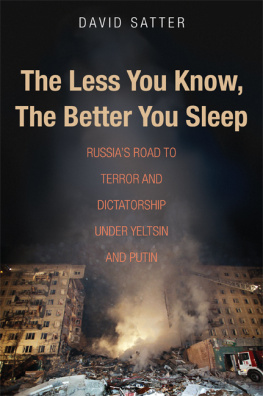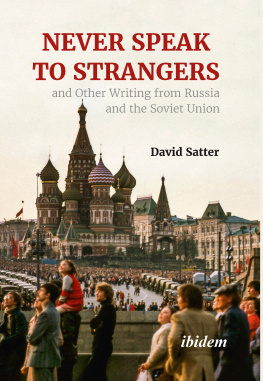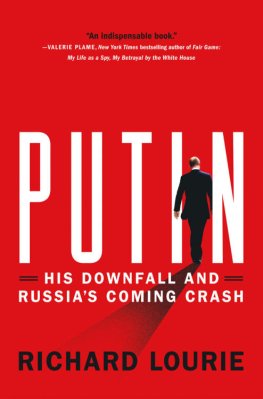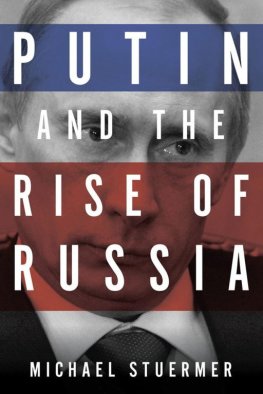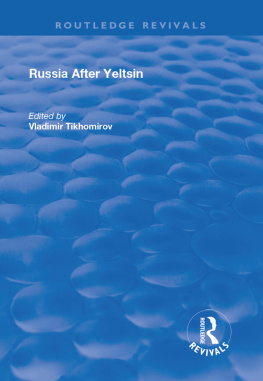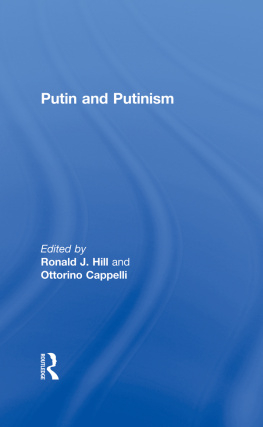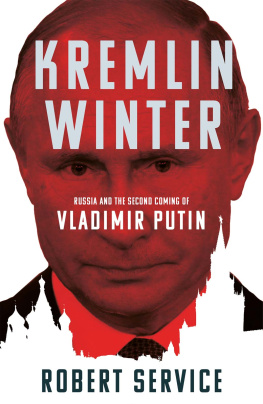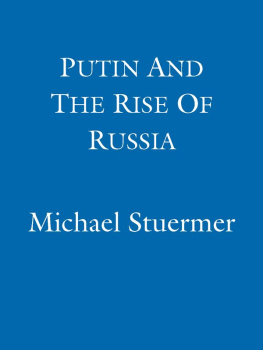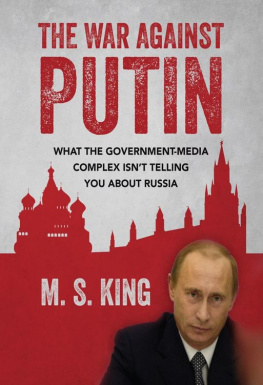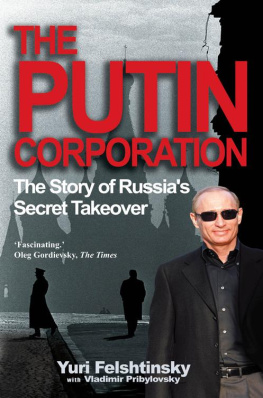The Less You Know, the Better You Sleep
Also by David Satter
It Was a Long Time Ago and It Never Happened Anyway:
Russia and the Communist Past
Darkness at Dawn: The Rise of the Russian Criminal State
Age of Delirium: The Decline and Fall of the Soviet Union

Copyright 2016 by David Satter. All rights reserved. This book may not be reproduced, in whole or in part, including illustrations, in any form (beyond that copying permitted by Sections 107 and 108 of the U.S. Copyright Law and except by reviewers for the public press), without written permission from the publishers.
Yale University Press books may be purchased in quantity for educational, business, or promotional use. For information, please e-mail (U.K. office).
Set Adobe Garamond and Gotham types by IDS Infotech, Ltd.
Printed in the United States of America.
Library of Congress Control Number: 2015952182
ISBN 978-0-300-21142-9 (cloth : alk. paper)
A catalogue record for this book is available from the British Library.
This paper meets the requirements of ANSI/NISO Z39.48-1992
(Permanence of Paper).
10 9 8 7 6 5 4 3 2 1
To the memory of the victims of the Nord-Ost theater siege, the Beslan school massacre, and the Russian apartment bombings
In the middle of the journey of our life, I found myself in a dark wood because the straightforward way had been lost. It is a hard thing to speak of. How wild, harsh and impenetrable that wood was, so that thinking of it re-creates the fear. It is scarcely less bitter than death: but in order to tell of the good that I found there, I must tell of the other things I saw there.
Dante Alighieri, Inferno
Contents
Preface
On December 23, 2013, I received word that the Russian Foreign Ministry had finally approved my visa and issued a number for my visa approval letter. I had been living in a rented apartment in Kiev while a revolution unfolded on the streets, writing a diary for Radio Liberty and other publications about the extraordinary events that were freeing a people and propelling the world to a new crisis.
Despite the fascination of events in Ukraine, I was anxious to bring the Russian bureaucratic process to an end. I had been waiting three weeks for the approval and wanted to return to Moscow where, after years of traveling back and forth from the United States, I hoped to settle for at least a few years. With the news of approval, all I had to do was go to the Russian consulate and present the number, along with a completed application and photograph.
On Christmas Eve, I went to the consulate and was buzzed in by staff members. The consul greeted me cordially and asked me to wait while he retrieved the approval letter. After an hour and a half, he returned and said that he had found my number in the consular log but that there was no letter. At my request, he searched for the letter twice more without success. Finally I asked him: Has there ever been a case in your experience where the Foreign Ministry issued an approval number without an accompanying letter? No, he replied, never.
Back in my apartment, I called the Foreign Ministry in Moscow and explained the situation to Lev Lvovich, a diplomat in the press department. He seemed surprised and said he would consult with his superior. A half hour later, he told me to call the embassy the following day and ask for Alexei Gruby, a first secretary. Something had gone wrong, he said, but Gruby would make sure I received my visa.
That night, my documentary film, Age of Delirium, about the fall of the Soviet Union, was shown in the Maidan Nezalezhnosti (Independence Square), the epicenter of Kievs antiregime revolt. About a hundred people stood for an hour and forty minutes in subzero cold in an improvised outdoor cinema watching the story of the fate of ordinary people in the Soviet collapse. The next morning, I was interviewed by Kievs Espreso TV, an internet television network that covers the Maidan. After the interview I called the embassy and was connected to Gruby.
Ukraine celebrates the Orthodox Christmas, so all offices, including the Russian embassy, were open on December 25. Gruby, who was expecting my call, said he had a statement to read to me: The competent organs have determined that your presence on the territory of the Russian Federation is undesirable. My application to enter Russia had been refused. The phrase competent organs is used in Russia to refer to the Federal Security Service (FSB). The formula your presence is undesirable is used in espionage cases. I had never before heard it applied to a journalist.
The Russian authorities were not objecting to anything I had written. My previous stay in Moscow had been only three months, during which time I had been able to do little more than open a bank account, familiarize myself with the operations of the Radio Liberty Russian Service, where I was to serve as an adviser, and organize an
When I first began working in Russia, in 1976, as a correspondent for the London Financial Times, I quickly concluded that Russia was an alternate universe that could be understood only through the details of individual Russians lives. These efforts led to an attempt to expel me in 1979 for hooliganism. I survived that attempt because both the British and the American governments threatened to expel Soviet correspondents in retaliation, and I remained in the Soviet Union until 1982, when I left to write my first book, Age of Delirium: The Decline and Fall of the Soviet Union. It was this book that became the film shown on Christmas Eve in the Maidan.
During the 1980s, I was refused visas to the Soviet Union and was able to enter the country on reporting trips just twice, after the U.S. State Department threatened retaliation against Soviet correspondents if I was barred. In 1990, with perestroika under way, I continued to be blacklisted. I was apparently the last journalist still banned. But Readers Digest, for which I was writing pieces about Russia, threatened to cancel plans for a Russian-language edition of the magazine. The Soviet authorities were encouraging Western institutions to set up in Moscow and, faced with the Digest ultimatum, decided to give in.
For the next two decades, I traveled freely to Russia, writing two books and hundreds of articles. In 1999, after four apartment buildings in Russia were blown up, killing hundreds of residents in their sleep and providing the pretext for starting the second Chechen war,
Despite these stories, I regularly received visas, and persons connected to the Russian authorities pointed to me as an example of the regimes tolerance of free expression. In fact, this tolerance was based on the authorities confidence in their ability to manipulate Western opinion. The picture of contemporary Russia sent back by Western journalists and academics was far from favorable, but it hardly conveyed how morally damaged Russia really was.
An example of the Russian success in manipulating Western observers was the Valdai Discussion Club, organized as a means of influencing the worlds leading experts on Russia, both journalists and academics. One of the great attractions of the meetings was the opportunity to question Putin and other Russian officials in a supposedly informal setting. Russian officials were unfailingly generous with their time and hospitality, but they tightly controlled the proceedings, providing detailed answers to prepared questions and ignoring or giving short shrift to those that were even mildly critical. The participants, anxious not to offend their hosts for fear of not being invited back, engaged in self-censorship, as the Russian authorities knew they would. After the sessions, the participants in the club returned to the West, where they often cited their firsthand contact with Russian leaders and parroted what they were told.
Next page
